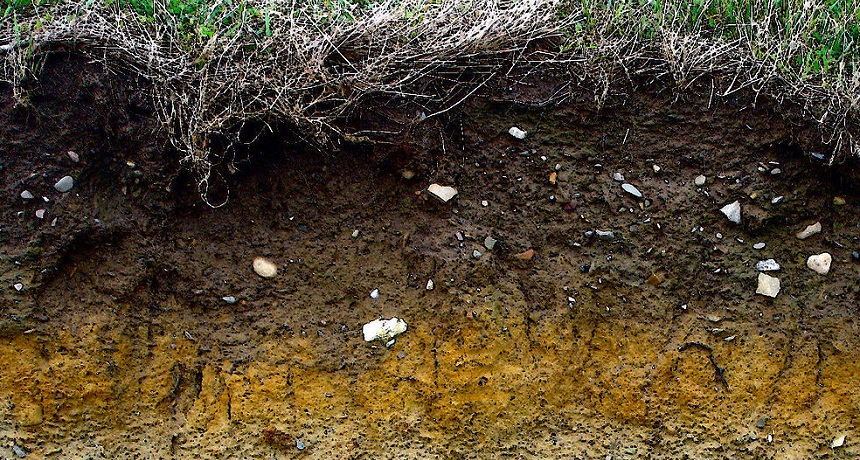Dig dirt? It’s World Soil Day
It’s time to appreciate the ground beneath our feet and the many benefits it gives us

Soil is a complex mixture that helps to feed and support most of the food we eat.
HolgerK/Wikimedia Commons
Soil is not simply something that we need to get off our shoes, or that turns to mud in the rain. It’s a complex mix of minerals, decaying matter such as leaves, gases, liquids — and living things such as fungi, worms and insects. This potent combo supports the plants we see all around us. It also supports the animals — including people — that dine on those plants. As water filters through soil, minerals, plant roots and microbes help to clean it so we can use that liquid again. We couldn’t live without soil.
In spite of its vital role, soil often goes unappreciated. But today is a great opportunity to change that. Today, World Soil Day, is a day to learn about and appreciate the dirt in our lives. The Food and Agriculture Organization of the United Nations has posted a list of events on its website. But if you can’t make it to one of those, you can always read about soil. Below are eight different articles about soil and everything it does for us.
1. Recycling the dead. Soil is partially made up of decaying matter, and that means dead things. This article explains how rotting organisms such as plants and animals contribute to good soil.
2. The worst drought in 1,000 years. Leaving a field with bare soil can release a lot of dust to blow in the wind. You may have heard in your history classes about the Dust Bowl of the 1930s in the American West. This piece explains what caused it.
3. Gold can grow on trees. Soils contain a range of minerals, from every day iron to precious metals such as gold. And some plants can take up the shiny metal into their leaves, showing that humans are not the only species to dig gold.
4. Some dirt won’t hurt. Washing your hands is often good advice. But a little bit of dirt doesn’t hurt. The bacteria in soil might help us stay healthy.
5. Fungi as carbon keepers. Soil can store a lot of carbon from decomposing animals and plants. If soil released it into the air, it could contribute to faster and more dramatic climate change. It turns out some of that carbon isn’t in the dirt itself, but in the fungi who call the soils home.
6. Tiny earthworms’ big impact. Gardeners tend to like earthworms because they mix the soil, loosening it and moving nutrients around. Earthworms even shred leftover plant parts into smaller fragments eaten by microbes. In these ways, earthworms can improve and enrich the soil, allowing garden and certain crop plants to grow better. But many American scientists are coming to view some earthworms as enemies.
7. Dirt is not soil. No matter what your dictionary says, just because it’s dirty doesn’t mean it’s soil. Soil scientists have their own definitions for this critical part of our planet.
8. Growing healthier tomato plants. Soil contains the chemicals that help fuel plant growth, but we can boost that process with mulch and fertilizer. This piece shows how the different options that farmers choose can change how a plant — and the food it produces — turns out.
Follow Eureka! Lab on Twitter
Power Words
climate The weather conditions prevailing in an area in general or over a long period.
climate change Long-term, significant change in the climate of Earth. It can happen naturally or in response to human activities, including the burning of fossil fuels and clearing of forests.
fertilizer Nitrogen and other plant nutrients added to soil, water or foliage to boost crop growth or to replenish nutrients that removed earlier by plant roots or leaves.
greenhouse gas A gas that contributes to the greenhouse effect by absorbing heat. Carbon dioxide is one example of a greenhouse gas.
greenhouse effect The warming of Earth’s atmosphere due to the buildup of heat-trapping gases, such as carbon dioxide and methane. Scientists refer to these pollutants as greenhouse gases. The greenhouse effect also can occur in smaller environments. For instance, when cars are left in the sun, the incoming sunlight turns to heat, becomes trapped inside and quickly can make the indoor temperature a health risk.
nitrogen oxides Pollutants made up of nitrogen and oxygen that form when fossil fuels are burned. The scientific symbol for these chemicals is NOx (pronounced “knocks”). The principle ones are nitric oxide (NO) and nitrous oxide (NO2).